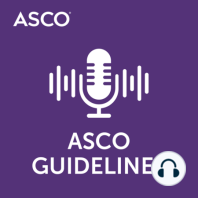15 min listen
Targeted Therapy and Immunotherapy for Gastroesophageal Cancer Guideline
FromASCO Guidelines
ratings:
Length:
14 minutes
Released:
Jan 5, 2023
Format:
Podcast episode
Description
Dr. Manish Shah discusses the first ASCO guideline for advanced gastroesophageal cancer. He addresses biomarker testing to help guide therapy - including HER2 testing, mismatch repair testing, and assessment of PD-L1 expression. Dr. Shah then reviews the evidence-based recommendations from the ASCO Expert Panel, including first-line therapies for esophageal, gastroesophageal junction (GEJ), and gastric adenocarcinoma, along with esophageal squamous cell carcinoma, based on these biomarker results, as well as evidence in the second-line setting – and beyond – and how to provide optimal care for these patients. Read the full guideline, "Immunotherapy and Targeted Therapy for Advanced Gastroesophageal Cancer: ASCO Guideline" at www.asco.org/gastrointestinal-cancer-guidelines TRANSCRIPT Brittany Harvey: Hello, and welcome to the ASCO Guidelines podcast series, brought to you by the ASCO Podcast Network; a collection of nine programs covering a range of educational and scientific content, and offering enriching insight into the world of cancer care. You can find all the shows, including this one, at: asco.org/podcasts. My name is Brittany Harvey, and today, I'm interviewing Dr. Manish Shah, from Weill Cornell Medicine, in New York, New York, lead author on 'Immunotherapy and Targeted Therapy for Advanced Gastroesophageal Cancer: ASCO Guideline’. Thank you for being here, Dr. Shah. Dr. Manish Shah: Thank you for having me. It's great to be here, and I'm looking forward to our interview. Brittany Harvey: Great. And first, I'd like to note that ASCO takes great care in the development of its guidelines, and ensuring that the ASCO Conflict of Interest policy is followed for each guideline. The full Conflict of Interest information for this guideline panel is available online, with the publication of the guideline in the Journal of Clinical Oncology. Dr. Shah, do you have any relevant disclosures that are directly related to this guideline topic? Dr. Manish Shah: Yeah. So, I've received research funding from Merck, as well as from Bristol Myers Squibb, as well as from Oncolys Pharma. These are all companies that have worked for immunotherapy and upper GI cancers. Brittany Harvey: Okay, thank you for those disclosures. Then diving into the content here, what is the scope and purpose of this first ASCO guideline for advanced gastroesophageal cancer? Dr. Manish Shah: Thank you. As you point out in the question, this is the first guideline for advanced gastroesophageal cancer, and really it is a very timely guideline because the landscape for the management of upper GI cancers has evolved and changed dramatically in the last several years. For a long time, we were really focused on chemotherapy for esophagus and gastric cancer. We, in fact, treated squamous cell cancer of the esophagus very similar to adenocarcinoma of the esophagus. And even though we knew of the different disease subtypes for gastric cancer, they didn't really play a role in differentiating management. About 10 years ago, trastuzumab was approved for the treatment of HER2-positive gastric cancer, but since then, we've had really a run of significant positive studies that have informed practice, and we felt that this was really a timely guideline to help us with regard to our patients with upper GI cancer, particularly, with metastatic disease who need first-line, and beyond therapy. Brittany Harvey: Excellent. Then you've just mentioned that the management of these upper GI cancers has evolved, so I'd like to review the key recommendations of this guideline that you just gave an overview of. So, starting with first-line therapy - is immunotherapy, or targeted therapy in combination with chemotherapy, recommended as first-line treatment for advanced gastroesophageal adenocarcinoma or squamous cell carcinoma? And what are these recommendations by the subgroups of patients by HER2 status or PD-L1 protein expression? Dr. Manish Shah: The answer to that is that, in fact, it is
Released:
Jan 5, 2023
Format:
Podcast episode
Titles in the series (100)
Patient-Clinician Communication Consensus Guideline: An interview with Dr. Timothy Gilligan from Taussig Cancer Institute and Institute and the Center for Excellence in Healthcare Communication, Cleveland Clinic, Cleveland, OH on the guideline providing guidance to oncology clinicians on how... by ASCO Guidelines
